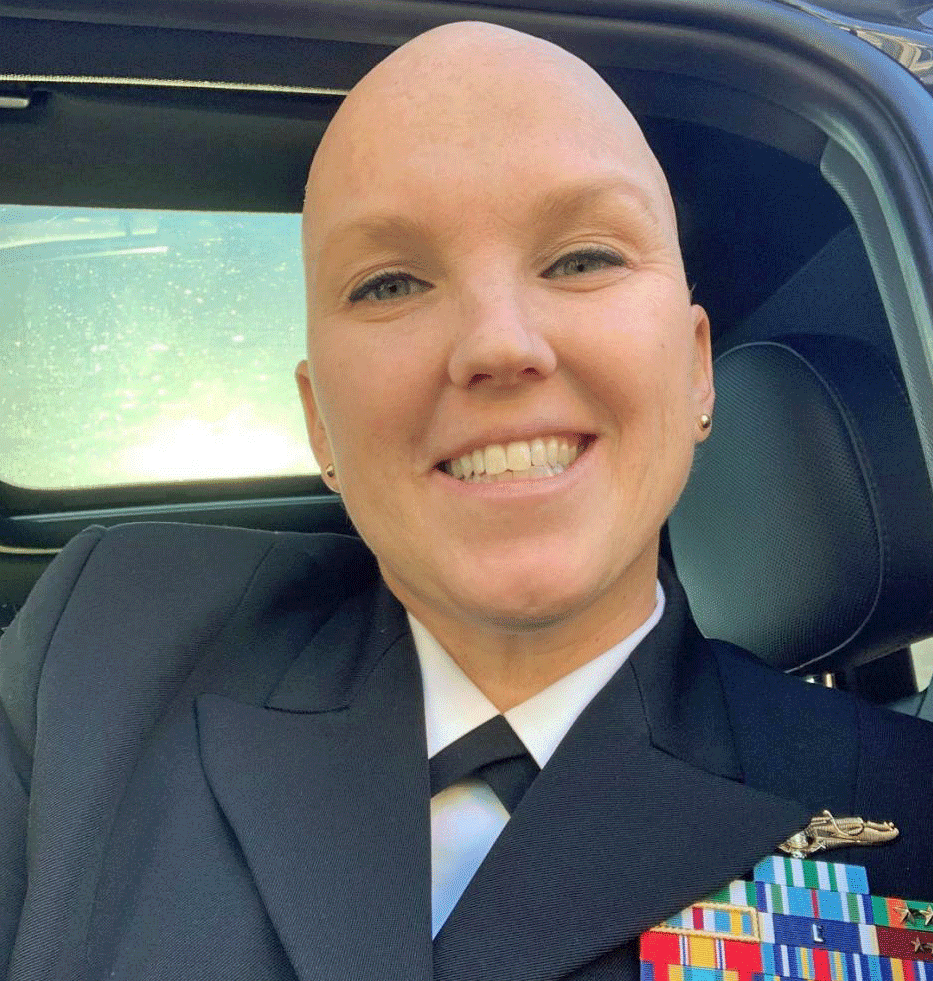The noble call to serve in our nation’s military is a demanding feat requiring high-moral character and, as Army Gen. (Ret.) Colin Powell would say, “…a vigilance that is perpetually optimistic.”
In a relatively short timeframe, Naval Meteorology-Oceanography (METOC) Officer, Oviedo, Florida-native and proud mustang, LT Sarah Beemiller— championed the U.S. Navy—completing the Seaman-to-Admiral 21 (STA-21) program for mid-career arrival as a Naval Officer.
It was when her diagnosis of Stage 2 Invasive Ductal Carcinoma (breast cancer) that Beemiller would need to rely on her high-moral character and perpetual vigilance to be “champion” of a new fight.
October 23, 2019, only 90-days into her tour as Operations Officer at Naval Oceanography Anti-Submarine Warfare (ASW) Center (NOAC) Yokosuka, Japan; Beemiller was medically evacuated to San Diego, CA.
As an Operations Officer at NOAC, she helped organize operations that deliver asymmetric warfighting advantages to U.S. Navy ASW forces, using oceanographic sciences with accurate and timely weather forecasts.
“I was diagnosed shortly after my 38th birthday, two-years before recommended screening, and three-years after my routine five-year physical,” said Beemiller. “I could have been diagnosed as early as 36-years old if I paid more attention to the warning signs.”
Beemiller’s condition worsened to Stage 3 after her first mastectomy (breast removal), as 5 of 17 lymph nodes removed were cancerous. “I currently remain high-risk, under medical surveillance, for possible metastatic disease that has progressed to my pelvis.”
After initial diagnosis, Beemiller would start “dense-dosing” chemotherapy, a treatment style conducted every other week, unlike traditional chemotherapy conducted once every other two-weeks. Her treatment began December 2019 through October 2020, so did COVID-19 and a global pandemic. These unfortunate circumstances prolonged Beemiller’s treatment, forcing her to endure two separate surgeries for mastectomies.
“I detoxed from chemo prior to my first mastectomy in mid-April where they removed lymph nodes, and completed 30-rounds of radiation from Memorial Day to Independence Day (5-days a week), before having my second mastectomy in early September,” Beemiller said.
Murphy’s Law, the popular adage, can seem actual in Beemiller’s story. Yet, the mother, wife and Navy officer decided to forge her own narrative, not defined by breast cancer, instead a story written of resilience and perseverance.
“My breast cancer is Estrogen and Progesterone positive (hormones feeding cancers growth), and I elected to have a total hysterectomy to reduce recurrence and eliminate requirement for bi-annual shots requiring daily hormone therapy medication to reduce hormone production...”
Beemiller admits her diagnosis to self and family were not easy…confusion and stress did ensue, but relief would come. “I will remain on this therapy plan for the next 5-10 years,” she said.

The Confusion.
“How do I explain this to my 9-year-old son and not scare him…How do I break this to my daughter who just started college without shifting her focus… How will this limit me as a mother, as a wife, as a Sailor?,” said Beemiller.
The Stress.
“Our [Beemiller’s family] household goods were to be delivered in Japan the week after I was diagnosed; we ended up living out of suitcases from June to mid-December,” Beemiller continued. “I started treatment, my son started yet another new school and my husband resumed teleworking with a few pieces of rented furniture and a couple of air mattresses.”
The Relief.
“When I arrived to Balboa Naval Medical Center and understood that not only did they have a plan but, everyone from my nurse navigator, oncologists, surgeons, therapists and corpsman had a vested interest in my care and well-being and seeing me return to full-duty,” said Beemiller. During treatment, Beemiller was motivated by family, her job as a Navy Sailor and an undying love for running.
“…I was persistent…whether preparing for, or recovering from, surgery or healing from various therapies—my goal was to get back to running/jogging/walking a 5k…physically find my way back to being me; a healthy me,” she said.
Beemiller’s love for the Navy was expressed during her stay at Balboa, where she helped a Navy Corpsman organize and submit a STA-21 package; re-enlisted a Navy Corpsman for their final four-years; presented a Navy Accommodation Medal and served as promoting officer for two Navy Lieutenants.
When Beemiller joined a family of warfighters, called the U.S. Navy, she also joined a family that would step-up and help fight her newest battle.
“NOAC’s CO, XO and SEL acted fast and communicated early to Commander, Naval Meteorology and Oceanography Command (CNMOC) to secure required paperwork and procedures, while Navy Personnel Command made sure I was informed of options for treatment locations, and how to navigate those choices to fit my family,” said Beemiller. “Fleet Weather Center-San Diego has balanced giving me the space and time to heal with a workload that allows me to contribute.”
As a Navy Lieutenant stationed at FWC-SD, Beemiller is responsible for providing weather advisory service for safety and damage avoidance to DoD, service and foreign vessels; and spanning long-range planning to in-transit surveillance throughout the Navy’s Third, Seventh and Fifth Fleets as a Ship Routing Officer.
Beemiller’s entire family and network of friends and Sailors helped her through a serious health milestone, and persevere with grace. “From RADM John A. Okon, former CNMOC, through the Chief’s mess and to the Deckplates, I’ve never felt like a cancer patient, like I was different - just a cared for member of the Navy METOC team!”
U.S. Naval Meteorology and Oceanography Command directs and oversees more than 2,500 globally-distributed military and civilian personnel who collect, process and exploit environmental information to assist Fleet and Joint Commanders in all warfare areas to make better decisions, based on assured environmental information, faster than the adversary.
